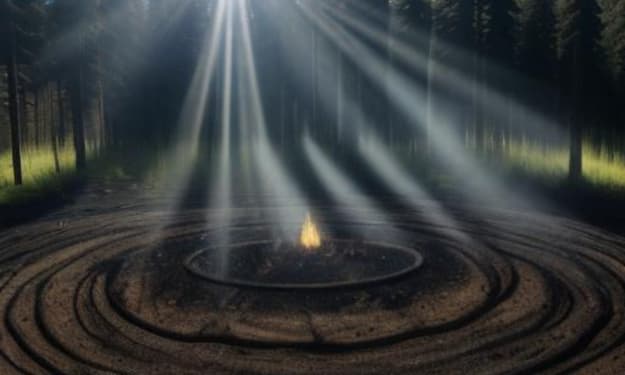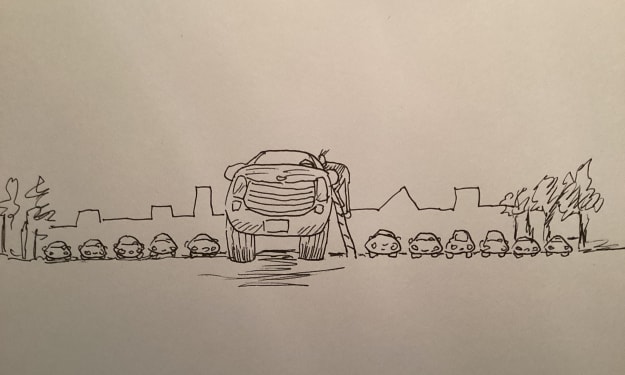
In my thirty-odd years on this Earth, I can't recall a time that I've ever sustained a major injury. No broken bones, no chipped teeth, not even a sprained ankle to speak of; in that regard, I suppose I’ve been lucky. At the same time, it seems unfair that my first true encounter with pain should come in the form of complete bodily annihilation. In truth, I don’t know what caused it. One moment, I was standing in line at the bank, the next, I found myself a crooked and swollen pile of jutting bones and twisted limbs. I think I’m missing a few of them, even, but I can’t be sure. It’s becoming increasingly difficult to feel anything but my chest filling with a warm liquid that I can only imagine isn’t supposed to be there. I’m surprised that I even managed to regain consciousness. I know it won’t last.
I can’t look at myself right now, or else the mental image of my mortality will become concrete reality. So I look at the ceiling. It’s not a hard strain on my neck, fortunately. There’s not actually much ceiling left, though. It looks like it was recently on fire, but what’s left is a broken, smoldering sheet that doesn’t know what to do with itself. What actually brings a tinge of fear into my mind, however, is the sound. There isn’t any. If this were an isolated bombing, I would expect ambulances, helicopters, people running around. Maybe it’s something bigger than a bomb. Maybe there’s an ambulance driver out there, looking through the roof of their blown-out dispatch center, wondering if there are people like me who need saving.
That’s an upsetting thought, I don’t think I like it. I look away from the ceiling and let my head fall where it naturally rests. My line of sight is interrupted by the front desk. I was next in line. There’s a teller slumped over the counter beside me, apparently knocked over by whatever hit us. She’s not breathing. Her long hair drips down the back of her head, threatening to graze a dislocated piece of dusty floor tile. Her face rests in profile. Much of it is mercifully curtained by her hair, but the sliver that I can see is a sickening bright red. My instinct is to look away, but my attention is caught by a small puddle of cord and metal below her head.
The larger of the two items is a black lanyard with the bank’s logo, terminating in a laminated nametag. Its white-on-blue block letters hold my gaze longer than they should. They seem almost antique, a thing that I have only a conceptual knowledge of, but have never actually encountered myself. A relic of something bygone in a new era that no longer needs it. “Hello, My Name Is:” they read. The mere notion of names washes over me like jamais vu. Certainly I know what they are and that even I must have one, but what use could they have anymore? Maybe that’s an overreaction. Maybe names are all we have left in whatever world is left outside this not-bank. My house could be a smoking crater for all I know. My dog might be a scorched spot on the pavement. Maybe I’m only telling myself these things because I know there’s a woman’s name on this tag, barely censored by the blur of my peripheral vision. I feel a metaphorical pit in my stomach, matching the literal one that I feel in my chest. I swallow hard, hoping in vain to fill one or both of these cavities. I look down.
In thick, smooth permanent marker, the name overwrites all of my racing thoughts. All capitals, perfectly centered. “STEPHANIE,” she was. I feel like I should gag, but this is a purely psychological response; I don’t have the necessary connections to vomit anymore. The reality of my situation begins to set in. A few minutes ago, we were ordinary people doing what we could to make it to tomorrow. A few minutes from now, if I even make it that long, I’ll be just like Stephanie: a pile of endings to lives left unlived.
As I jerk my eyes away from the orphaned name, my eyes lock on something that they had only scanned over before. Entwined with the thick polyester braid of the lanyard is a thin, glinting chain of gold, affixed to which sits a small, unadorned locket in the shape of a heart. Whatever few feelings of hope I might have scraped from my own, barely beating heart instantly faded. Had I simply closed my eyes and died, Stephanie would have been little more than a name without a face that I might hopefully follow into some cathartic hereafter, far from what I can only expect will become the din and horror of our enraged successors. Fight over this rotting husk, ye road warriors, I’m joining the choir invisible!
But that’s no longer an option. Now Stephanie is more than a fellow victim of the powers that be. Now she’s a memory of a real person, plucked from the past tense into my metaphysical here-and-now. That Stephanie’s life took the twists and turns necessary to end up lying right here in front of me has graduated from passive theory into ontological fact. Against my own will or intent, I begin to invent a biographical history of Stephanie. Her interests, her friends, her ambitions are all a matter of objective fact sitting just outside my reach, leaving me to fill in the gaps myself.
Stephanie was always a transplant growing up. Her family never settled in one place for long on account of her mother’s highly successful yet hectic career as a spiritual consultant for corporate executives. Crystal ball divinations, Ouija consultations, tarot ministrations, anything to get an easy leg up in the rat race. Stephanie (“Steph” to her friends) never put much stock in the intangible or unverifiable, but respected her mother’s success, nonetheless. Her school days were largely spent in vague disaffection until her sophomore geometry teacher introduced her to the classic Chinese board game, Go. Hailing from largely Anglo-American ancestry, Steph had little familiarity with foreign cultures, outside of surface details.
For the first time in her life, Steph had ignited a real passion for something. When she wasn’t playing Go, she was thinking about it, poring over books on traditional strategy and modern game theory. While her mother was generally, if distantly, supportive of her daughter’s hobby, Steph resolved to take a step toward something more profound. Shortly before graduating high school, she entered a regional Go tournament in her (recent) home state of Michigan. Her performance, while far from exceptional, was admirable, and enabled her to network with enthusiasts and professionals from the surrounding areas. It was there that she met Marcus Fleischer, a retired banker from Lansing who had recently begun to offer tutoring for up-and-coming Go players. The two began a friendly correspondence with one other, eventually prompting Marcus to offer Steph a position as his apprentice following her graduation, as well as a letter of recommendation for a day job at his former branch of operation.
Obviously, she accepted immediately, pending approval from her mother. After a lengthy discussion about financial responsibility and ambitious practicality, her mother acquiesced, having experienced largely the same sense of driven purpose upon discovering the spiritual arts. On the day of her planned departure, Steph received a gift from her mother: a heart-shaped locket on a thin golden chain. As Steph, full of joyous tears, began to open the locket, her mother stopped her. According to her, the locket had been imbued with her own spiritual energy, and was meant to act as a talisman. The only circumstance in which Steph was permitted to open the locket, she said, was in the midst of her darkest days, when the only thing that could bring true peace was an uninhibited laughing fit. Apparently, she had inserted something outrageously hilarious in the locket’s cameo slot.
Taking this to heart, Steph set off for her future with a full heart. Her days passed calmly behind her teller’s desk, while her evenings were filled with deep dives into the complexities and elegance of her true passion. For once, all was right in Steph’s world, and her prospects truly shone with a new radiance.
But now Stephanie is no more. Nor was she ever any of these things I imagined her to be. She died as she lived, stuck behind the counter at work, waiting for something better to come along, eulogized only by some wheezing creature waiting for its own end to come as swiftly as hers.
As I come back to this new understanding of reality, a perverse thought flashes through my mind. Perhaps on behalf of my own bastard biography of this once-person, or perhaps by a product of natural curiosity, I feel an overwhelming urge to unhinge the locket’s face and see its contents for myself. But this, I rationalize, would be a complete transgression of Stephanie’s privacy and dignity as a human being. Just as well, this perversion tells me, there can be no consequences anymore. Whoever enacted this state of utter obliteration certainly had no regard for them, so why should a helpless victim in the final seconds of life? I could argue with myself further, but there’s no point. I decide that knowing can be my only true connection with another human being before I ultimately cease to be one myself.
I jerk myself over onto my side and prepare to grasp the locket with my final ounces of strength. I feel something spill out of me as my momentum ceases. I still can’t bear to look. As I recover from the intense pain of moving my quasi-body, a dark realization washes over me. I hesitate to make snap judgments, but truly I have no time left. Swallowing all of my fear and reservation, I finally turn my head and look down at myself, and it all makes sense. I can’t even reach the locket. My arms are gone.
About the Creator
Enjoyed the story? Support the Creator.
Subscribe for free to receive all their stories in your feed. You could also pledge your support or give them a one-off tip, letting them know you appreciate their work.





Comments
There are no comments for this story
Be the first to respond and start the conversation.